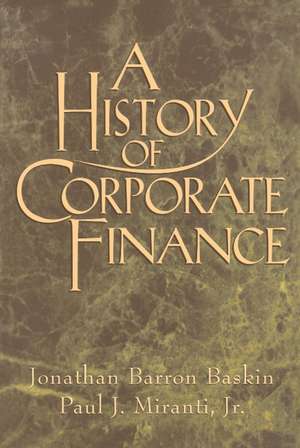A History of Corporate Finance
Autor Jonathan Barron Baskin, Paul J. Miranti, Jren Limba Engleză Paperback – 27 dec 1999
| Toate formatele și edițiile | Preț | Express |
|---|---|---|
| Paperback (1) | 311.49 lei 6-8 săpt. | |
| Cambridge University Press – 27 dec 1999 | 311.49 lei 6-8 săpt. | |
| Hardback (1) | 702.25 lei 6-8 săpt. | |
| Cambridge University Press – 27 feb 1997 | 702.25 lei 6-8 săpt. |
Preț: 311.49 lei
Nou
Puncte Express: 467
Preț estimativ în valută:
59.61€ • 64.73$ • 50.07£
59.61€ • 64.73$ • 50.07£
Carte tipărită la comandă
Livrare economică 23 aprilie-07 mai
Preluare comenzi: 021 569.72.76
Specificații
ISBN-13: 9780521655361
ISBN-10: 0521655366
Pagini: 364
Ilustrații: 5 tables
Dimensiuni: 150 x 228 x 24 mm
Greutate: 0.57 kg
Ediția:Revised
Editura: Cambridge University Press
Colecția Cambridge University Press
Locul publicării:New York, United States
ISBN-10: 0521655366
Pagini: 364
Ilustrații: 5 tables
Dimensiuni: 150 x 228 x 24 mm
Greutate: 0.57 kg
Ediția:Revised
Editura: Cambridge University Press
Colecția Cambridge University Press
Locul publicării:New York, United States
Cuprins
Preface; 1. History and the modern theory of finance; 2. Medieval and Renaissance origins; 3. Corporate finance in an age of global exploration: trading companies and oceanic discovery, 1450–1720; 4. The emergence of public markets for investment securities, 1688–1815; 5. Finance in an age of canals and railroads, 1775–1900; 6. Common stock finance and the rise of managerial capitalism, 1900–1940; 7. The financing of center firms, 1940–1973; 8. Conglomerates and leveraged buy-out partnerships; Appendix one: Finance and informational asymmetries in the ancient world; Appendix two: International patterns of corporate governance; Epilogue.
Recenzii
'A History of Corporate Finance by Baskin and Miranti provides a panoramic account of the evolution of financial organizations and practices from ancient time through the present. It also compares these organizations and practices with the assumptions and conclusions of contemporary financial theories. It is must reading for both history buffs and for students, scholars, and practitioners of financial theory.' Harry Markowitz, 1990 Winner of the Nobel Prize in Economics
'Business corporations, once rare, have become the dominant organization of the modern economy. The corporation as we know it owes its existence to a long history of financial innovations - in institutions, markets, and instruments (securities). This is the first in-depth history to tell us how it all happened, from the merchants and bankers of medieval and Renaissance Italy to today's corporate managers and wizards of Wall Street. Students of business, economics, finance, law, and history will learn much from it.' Richard Sylla, New York University
'No serious student of corporate enterprise can afford to ignore [the book's] implications for how finance has shaped institutional development. If there were no more than one important lesson to be learned from this study (and there are many), it is this: financial structure matters.' George David Smith, Business History Review
'An in-depth, panoramic study of corporate finance's history from the late Middle Ages to recent leveraged buyouts in a little over 300 pages seems rather extraordinary. This book is extraordinary.' Gerald P. Dwyer, Jr, The Journal of Economic History
'… this is a well-informed work, describing a series of coherent financial systems which constitutes an adequate introduction to the subject, albeit a conceptually restricted one.' Contemporary European History
'Business corporations, once rare, have become the dominant organization of the modern economy. The corporation as we know it owes its existence to a long history of financial innovations - in institutions, markets, and instruments (securities). This is the first in-depth history to tell us how it all happened, from the merchants and bankers of medieval and Renaissance Italy to today's corporate managers and wizards of Wall Street. Students of business, economics, finance, law, and history will learn much from it.' Richard Sylla, New York University
'No serious student of corporate enterprise can afford to ignore [the book's] implications for how finance has shaped institutional development. If there were no more than one important lesson to be learned from this study (and there are many), it is this: financial structure matters.' George David Smith, Business History Review
'An in-depth, panoramic study of corporate finance's history from the late Middle Ages to recent leveraged buyouts in a little over 300 pages seems rather extraordinary. This book is extraordinary.' Gerald P. Dwyer, Jr, The Journal of Economic History
'… this is a well-informed work, describing a series of coherent financial systems which constitutes an adequate introduction to the subject, albeit a conceptually restricted one.' Contemporary European History
Descriere
An overview of the role of institutions and organisations in the development of corporate finance.







